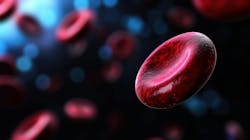Johns Hopkins Kimmel Cancer Center helped develop a procedure that could cure sickle cell disease.
According to a press release, the bone marrow transplant process “is safe and curative for adults with sickle cell disease, according to results of a trial completed at Johns Hopkins and about 20 additional cancer centers nationwide and in London.” The transplant is aimed to be a more affordable option for sickle cell disease patients.
The process is named “reduced-intensity haploidentical bone marrow transplantation” and includes patients receiving donated “half-matched” bone marrow from family members. Additionally, patients receive small chemotherapy doses pre-treatment and are given “total body irradiation.” Post-treatment, “they are given cyclophosphamide (a drug to prevent graft-versus-host disease, in which immune cells in the donor marrow attack their new host) and other drugs for up to one year.”
A study was conducted testing the bone marrow transplant option on 42 patients. The majority of them (95%) were still alive two years later and more than three quarters (88%) are cured.
The authors are saying, “The trial shows very high engraftment of the donor cells and very high cure rates.”
The research is published in The New England Journal of Medicine Evidence.

